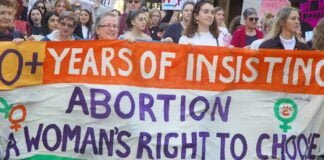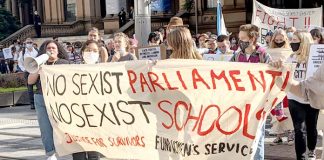It took a Cairns jury less than an hour to find Tegan Leach and Sergie Brennan not guilty on charges of procuring an abortion. It was a cause for celebration for the couple, as well as the many abortion rights activists crammed into the courtroom and chanting outside.
The decision has possibility widened the circumstances when the use of abortion drugs RU486 and misoprostol are legal. The verdict has redoubled pressure on Queensland Premier Anna Bligh to decrminalise abortion. Even the Queensland branch of the Australian Medical Association has criticised the current laws—but shamefully, Bligh is still dragging her heels.
Legal challenge
Leach and Brennan were charged 18 months ago, several weeks after a police raid on their home found the empty packets of imported abortion drug misoprostol.
In Queensland, abortion remains in the criminal code—it is only accessible because of a court ruling in 1986 that allows abortion when a woman’s life, meaning her mental and physical health, is in danger. A similar situation exists in New South Wales. The charges laid against Leach and Brennan highlight how vulnerable access to abortion is in these two states.
Leach was charged under an archaic section of the criminal code that says a woman is guilty of procuring an abortion if she, either actually pregnant or not, either permits another person to attempt to procure an abortion for her, or “herself uses any force or any noxious thing, or any other means, with the aim of bringing about an abortion.” She faced up to seven years in prison. Her partner, who faced up three years, was charged under the same laws for supplying the abortion drugs.
It was widely assumed that the Labor government’s desire not to use the laws and not to change them would prevent a prosecution. But the police and the Department of Public Prosecutions pulled out all stops, even flying Brisbane prosecutors to Cairns for the trial who usually only attend murder cases.
The judge forced the hand of the jury in the case by asking them to consider whether the drugs were indeed “noxious”, defined to mean “injurious or harmful” to the woman. For a conviction, the jury was told they must be sure beyond reasonable doubt that the drugs were noxious. Expert witnesses told the jury that the drugs are safe and both on the World Health Organisation list of essential drugs. This was the loophole that allowed the jury to find Leach and Brennan not guilty.
The judge’s interpretation and the decision of the eight women and four men of the jury confirms the widespread support for abortion rights. The verdict is a clear victory.
Two Queensland public hospitals are now beginning to prescribe RU486. But until the law changes, all abortion access will remain fragile and expensive. Because of the legal situation, it is still very difficult to get an abortion in a public hospital in Queensland—only 1 per cent of abortions are carried out there. Most are carried out by private providers for hundreds, sometimes thousands, of dollars.
Bligh’s lies
After the charges were laid last year, some doctors stopped performing abortions in public hospitals, meaning some women were forced to travel interstate to have abortions. Bligh passed an amendment to the criminal code in October last year to allow doctors to prescribe RU486 under the existing conditions. But disgracefully, she ruled out decriminalisation.
In a deliberate attempt to confuse the facts, Bligh has repeatedly lied in media statements about the case, claiming, falsely, that the case was about illegal drugs.
In recent statements, Bligh has claimed she wants reform but doesn’t have the numbers to support a bill.
According to ex-Labor MP Bonny Barry, Bligh is also lying about the numbers in parliament. In a press conference prior to the trial commencing, Barry apologised for bowing to pressure from former Queensland Premier Peter Beattie and later Bligh and not moving a private members bill when she had the chance.
Women in Queensland can’t wait around while parliamentarians twiddle their thumbs any longer.
The abortion rights campaign in Queensland has grown into a real force over the past 18 months. The NTEU national council moved a motion in support of the campaign that passed unanimously. After lobbying from the campaign, GetUp! is now running television ads on the issue. We’ll now be pushing full steam ahead to force Bligh to act.





